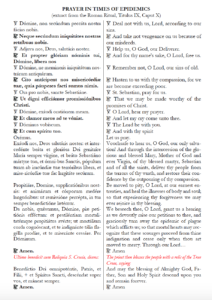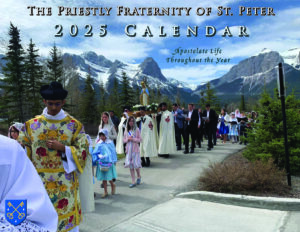Meditations to Accompany You Through Holy Week
The ancient and mysterious ceremonies of the Church’s Holy Week merit a great deal of time for preparation and prayer. Those confined to their homes due to the coronavirus in this exceptional year will be consoled by the detailed descriptions provided by Dom Prosper Guéranger, the 19th C. abbot who re-established the Benedictine monastery at Solesmes, France. As featured here before, St. Francis de Sales Parish, our apostolate in Atlanta, has been digitizing his 15-volume series The Liturgical Year and making it available via email for those who would like to receive every entry in their inboxes (subscribe here: https://fsspatl.com/email-subscription). We will be posting links to the Holy Week entries throughout the coming days.
Dom Guéranger’s work includes descriptions, along with the Latin liturgical texts and translations into English, of many special parts of this most important week in the year. It is important to note that he describes the ceremonies that were celebrated by the Church before the changes to the Holy Week liturgies in the 1950s. Many FSSP apostolates have received special permission from the Holy See to use the older ceremonies.
We will begin our meditations today, with Dom Guéranger’s entry for the Monday in Holy Week.
This morning, also, Jesus goes with His disciples to Jerusalem. He is fasting, for the Gospel tells us that He was hungry, He approaches a fig-tree, which is by the way-side; but finds nothing on it, save leaves only. Jesus, wishing to give us an instruction, curses the fig-tree, which immediately withers away. He would hereby teach us what they are to expect, who have nothing but good desires, and never produce in themselves the fruit of a real conversion. Nor is the allusion to Jerusalem less evident. This city is zealous for the exterior of divine worship; but her heart is hard and obstinate, and she is plotting, at this very hour, the death of the Son of God.
You can read the rest of today’s entry here, and livestream the liturgies of Holy Week on LiveMass. +
April 6, 2020

Hosánna Fílio David
Hosánna fílio David: benedíctus, qui venit in nómine Dómini.
Hosanna to the Son of David: blessed is He Who cometh in the Name of the Lord.
Antiphon for the Blessing of Palms
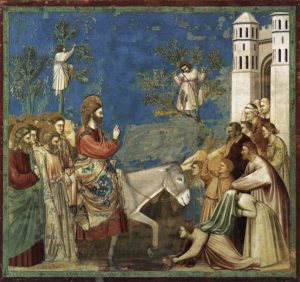
Today is Palm Sunday, the beginning of Holy Week. On this day Our Lord enters triumphantly into Jerusalem, welcomed as a King by the crowds that lay cloaks and palm branches in His path and hail Him as the royal Son of David. It seems at last the jealous conniving of the scribes and Pharisees has been silenced, and that He is receiving the praise and recognition He deserves.
But only a few days later He will stand in chains in the court of Pilate while the crowds demand the release of a criminal. Now he is greeted with smiles and joyful cries of Hosánna, but soon He will be jeered and scorned with cries of “Crucify Him, crucify Him!” He will soon trade this regal reception for a crown of thorns, this royal road into the holy city for the Via Dolorosa that will take Him outside the city, to Golgotha where He will be executed as an outcast of the people. So many stand by Him now, but so few will stand by Him on Good Friday.
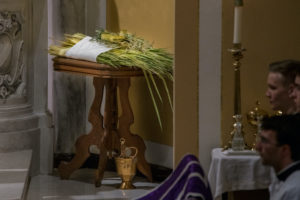
We might feel especially sorrowful this Holy Week, as most of us will spend the sacred hours of the Triduum without its beautiful liturgies. As we watch the ceremonies livestreamed from afar and cannot participate in the same way we usually do, we may feel like we are not accompanying our King. But nothing could be further from the truth. We are simply accompanying Him in a different way, in some respects a deeper way which, if we allow it, will draw us even closer to Him. He is allowing us to accompany Him in His solitude, for He Himself faced this time alone, deprived of friends, supporters, consolations. The only ones who stayed with Him were those closest to Him: His Mother, St. John, St. Mary Magdalene. Let us, then, not become despondent, angry or frustrated, things that put us so far from Our Lord, but let us be counted among those closest to Him, those who followed Him down the longest road, those who loved Him to the end. +
Follow the liturgies of Holy Week live at LiveMass.
April 5, 2020

Good News from Wigratzbad!
Thank you all for your prayers on behalf of the priests and seminarians at our Wigratzbad seminary, which was hit hard with the coronavirus at the beginning of March. We are happy to report that, though the quarantine remains in effect, everyone is out of the hospital and only a few are still seriously ill. Work and classes are resuming and seminary life is gradually returning to normal.
In announcing the mostly-good health of the residents, the seminary wrote on its website:
We thank the Lord for having saved us from the most serious consequences of the disease, and we obviously remain sensitive to the distress which now affects the whole world. With you, we pray for the sick, and especially the dying, as well as for the nursing staff and all those who dedicate themselves generously in these difficult times.
With the seminary we give thanks to God for these developments. Please keep in your prayers those who are still sick, all who are suffering from this virus and those working to care for them. +
April 3, 2020

Spiritual Communion and the Fruits of the Mass
The following article was published for the benefit of his parishioners by one of our new priests, Fr. William Rock, assistant pastor at Mater Misericordiae Mission, our apostolate in Phoenix, AZ. With so many of you unable to attend Mass at present, we thought it an excellent thing to share with you, so that you might know the great benefits of the many Spiritual Communions you are making and of the private Masses that our priests are offering for your intentions.
Spiritual Communion and the Fruits of the Mass
by Fr. William Rock, FSSP
In this troubling time, you should know that God and His Church have not abandoned you. Even with the prohibition of public Mass and Communion Services, there are still many sources of grace which are open to you. I would like to discuss two of them here – Spiritual Communions and the General Fruits of the Mass.
Following the teachings of the Catechism of the Council of Trent(1), also known as the Roman Catechism, there are three ways in which one can receive Communion: (1) Sacramentally-only; (2) Sacramentally-and-Spiritually; and (3) Spiritually-only.
Those who receive Communion while knowing they are in a state of Mortal Sin are said to receive Sacramentally-only. This is because, while they truly receive the Body, Blood, Soul, and Divinity of Christ under the appearances of bread and wine, they do not receive any spiritual benefits. On the contrary, they incur an additional sin.
Those who receive Communion Sacramentally-and-Spiritually receive the Body, Blood, Soul, and Divinity of Christ under the appearances of bread and wine and do receive spiritual benefits.
Those who receive Communion Spiritually-only receive the spiritual benefits of Communion without receiving the Body, Blood, Soul, and Divinity of Christ under the appearances of bread and wine.
The Catechism goes on to explain that those who receive Spiritually-only “are those who, inflamed with a lively faith which worketh by charity (Gal. 5:6), partake in, wish and desire of that celestial bread.” There are several things that should be noted from this passage.
The first is that in order to receive Spiritually-only, one must be in a state of grace, as the theological virtue of charity and Sanctifying Grace always exist together. So, one must have Sanctifying Grace, or be in a state of grace, in order to make a Spiritual Communion. If you are not in a state of grace, receive sacramental absolution as soon as you can (and be praying Acts of Contrition in the meantime). Editor’s Note: Even in the absence of public Masses, many parishes are still offering Confessions. Check with your parish for details.
Next, it is important to note that a Spiritual Communion must include a wish and desire to receive Sacramentally-and-Spiritually even though such a reception at the current time is not possible. It would be enough, then, when beginning to make a Spiritual Communion to pray, “Lord, I wish to receive You in a sacramental and fruitful Communion, but, as I can’t right now, I wish to receive You spiritually,” and then continue to pray as you would when receiving Sacramentally-and-Spiritually. There are prayers which are recommended by the Church for making a Spiritual Communion (Editor’s Note: St. Alphonsus Liguori’s version is included at the end). They do not necessarily need to be used, and one can draw phrases and ideas from them, based on one’s own dispositions, to prepare one’s own.
Spiritual Communions can be made at any time during the day or night, and as many times as one wants. One does not need to be in a church, in front of the Tabernacle, or even in front of a holy image. Spiritual Communions can be made anywhere, although clearly, it would be unfitting to make them in places ill-suited for virtue.
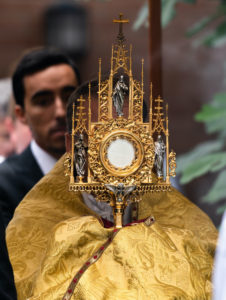
We should not worry that our sanctification is in some way impeded by receiving Spiritually-only and not Sacramentally-and-Spiritually during this time. As the Catechism states, those who receive Spiritually-only “receive, if not the entire [spiritual benefit of a Sacramental-and-Spiritual Communion], at least very great fruits.” So, the graces received from Spiritual-only Communions can be as great as the graces received in a Sacramental-and-Spiritual Communion.
But, in order to receive as many graces and fruits from a Spiritual Communion as one can, or even from a Sacramental-and-Spiritual Communion, one must be properly disposed. The better disposed one is, the more graces one is able to receive. To properly dispose oneself, one should pray preparatory prayers before receiving Sacramentally-and-Spiritually. These prayers can be found in hand Missals and elsewhere, or one could pray using one’s own words. How long one should spend praying such prayers will depend on the other duties one has to fulfill. This is why it is important to arrive with time before the start of Mass so that one can pray these prayers, if one is planning on receiving (remember that one is only required to receive Communion sacramentally once a year from the First Sunday of Lent to Trinity Sunday in these United States). One could also pray these prayers at home before departing for the church if doing them at the church would be difficult. To make a Spiritual Communion fruitful, one should dispose oneself in the same manner, adjusting the texts of the prayers as necessary. Preparations before receiving either Sacramentally-and-Spiritually or Spiritually-only should include some form of an Act of Contrition.
We know, however, that we attend Mass for more than just receiving Communion. When we attend Mass, we give God the worship due to Him as our Creator and our Redeemer by offering up to Him in an unbloody manner the bloody Sacrifice of Christ on the Cross. The two-fold Consecration of the bread and wine makes the Sacrifice of the Cross sacramentally present. As Christ’s Sacrifice is present, the fruits from that Sacrifice are made available to the faithful. These fruits are placed in four groups – (1) Ministerial Fruits, (2) Very Special Fruits, (3) Special Fruits, and (4) General Fruits.
The Ministerial Fruits are those fruits which are offered to those on whose behalf the Priest is celebrating the Mass. The intention listed in the bulletin for the Mass, for example, would be the recipient of these fruits (if the intention is one who can receive them).
The Very Special Fruits are those which are offered to the celebrating Priest Himself. As he is offering the Sacrifice of the Mass in persona Christi for others and for himself, these fruits are made available to him.
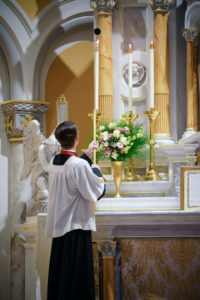
The Special Fruits are those offered to those who are cooperating in offering up the Sacrifice of the Mass by any external act (besides the Priest). This cooperation includes being physically present at Mass, but also by contributing materially to the celebration of the Mass. Those who have donated flowers, candles, vestments, liturgical vessels, and other such things being used in a Mass – including the church building itself – are all offered Special Fruits from that Mass. The amount of fruit offered to each is proportional “to their closeness of cooperation”(2) to the Sacrifice. So, the Altar Server in the Sanctuary will be offered more Special Fruits than that which will be offered to those in the pews.
Note, however, that there is a difference between the fruits being offered and the fruits received. The amount that is received is dependent upon one’s disposition. So, while the Altar Server might be offered more fruits, he may receive less than some in the pews as they, while offered less, were better disposed and thus actually received more than the Server. This is why, again, prayers of preparation before Mass are so important, not just for the reception of Communion, but also for receiving the fruits that will be made available and for worthily offering the Sacrifice of the Mass through the hands of the Priest.
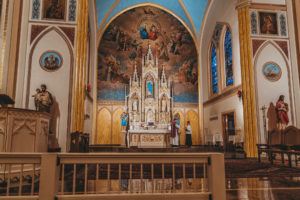
Lastly there are the General Fruits. These fruits are offered to all members of the Church, and even to those outside of the Church for their conversion. In order to gain these fruits, again, one must be properly disposed. This is why morning prayers and offerings are so important and why one should include in one’s morning prayers words to the effect of “Lord, during the course of this day, bestow upon me any Indulgences whose requirements I may fulfill and all fruits available to me flowing from all of the Masses said throughout the world today.” As Masses will continue to be said privately during this time, you should avail yourselves of these General Fruits which are produced. Additionally, if you feel that you qualify for Special Fruits due to any contributions you may have made, be sure to ask for those fruits also.
Hopefully you are able to see that the practices explained above are not to be used only during this unhappy time. These lessons should be integrated into the spiritual life of every Christian so that each may draw from all of the abundant sources of grace available to him. +
Spiritual Communion by St. Alphonsus Liguori:
My Jesus, I believe that You are present in the most Blessed Sacrament. I love You above all things and I desire to receive You into my soul. Since I cannot now receive You sacramentally, come at least spiritually into my heart. I embrace You as if You were already there, and unite myself wholly to You. Never permit me to be separated from You. Amen.
(1) Part II: The Sacraments – The Eucharist
(2) O’Connell, The Celebration of the Mass (1964), p. 39, n. 6.
March 31, 2020

Jesus Hid Himself
They took up stones therefore to cast at Him: but Jesus hid Himself, and went out of the temple.
John 8:59, the last words of the Gospel of Passion Sunday

Today is the commencement of Passiontide, the final two weeks of Lent, when Our Lord in a very literal sense hides Himself from our view. From now until the Easter Vigil, all the statues and images in our churches will be covered, with the crucifixes being revealed during the liturgy of Good Friday. The veiled statues are a somber reminder that Our Lord is withdrawing from us, and will soon be totally removed from our sight. The medieval French bishop Durandus connects the veiling of the statues with the way that Christ veiled His divinity during His Passion. As the prophet Isaiah says, “as one from whom men hide their faces, He was despised, and we esteemed Him not” (53:3).
It seems that Passiontide began early for most of us this year. We are already suffering separation from Christ as we bear with the suspension of public Masses due to the coronavirus, and perhaps the coming of Passiontide will bring home to us the potential fruits of this separation. 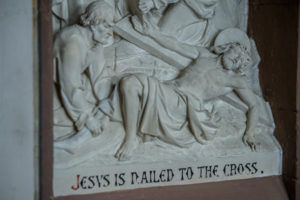 Through her yearly removal of Christ from us, the Church desires not only to call the historical events of Christ’s Passion to our minds, but also, perhaps, to reinvigorate that love for Him that often goes lukewarm in us throughout the year. The longer, deeper, more trying separation brought by the coronavirus further allows us time to reflect on the ways in which we have taken His Presence among us for granted, and how we have failed to love the Blessed Sacrament as we ought. Absence really does make the heart grow fonder, and perhaps when this is all over, when we are reunited to our absent Lord at last, a renewal of love and faith will occur in our own hearts, in those who have fallen away from Him, and maybe even in those who have never known Him. So stay strong, faithful friends. Our Easter will come. +
Through her yearly removal of Christ from us, the Church desires not only to call the historical events of Christ’s Passion to our minds, but also, perhaps, to reinvigorate that love for Him that often goes lukewarm in us throughout the year. The longer, deeper, more trying separation brought by the coronavirus further allows us time to reflect on the ways in which we have taken His Presence among us for granted, and how we have failed to love the Blessed Sacrament as we ought. Absence really does make the heart grow fonder, and perhaps when this is all over, when we are reunited to our absent Lord at last, a renewal of love and faith will occur in our own hearts, in those who have fallen away from Him, and maybe even in those who have never known Him. So stay strong, faithful friends. Our Easter will come. +
Livestreamed Masses available today and every day at LiveMass.
Cover photo of FSSP Warrington and inline photo of Warrington’s Eleventh Station by John Aron.
March 29, 2020

An Introduction to FSSP Vancouver
Holy Family Parish, our apostolate in Vancouver, British Columbia, Canada, recently published a fantastic new video introducing their beautiful and busy parish. Check it out! You might even be inspired to pay a visit…when, of course, the coronavirus allows it. In the meantime, we hope this video will bring some joy, beauty and uplifting music into your various quarantines. Hang in there!
Come to think of it, if your parish has something uplifting that they would like to share with the world, confined as we all are and perhaps battling a bit of sadness and discouragement as we wait out this unexpected winter, please send it to us at missive@fssp.com! +
March 27, 2020

Happy Feast of the Annunciation!
A happy and most joyful feast of the Annunciation of the Blessed Virgin Mary! On this day, a first-class feast for the Church, we commemorate the divine message which the angel Gabriel brought to Our Lady in Nazareth and the wondrous moment of the Incarnation, when the Son of God became the Son of Mary. Our Lady’s response is one which we should carry in our hearts every day: Ecce ancílla Dómini, fiat mihi secúndum verbum tuum. “Behold the handmaid of the Lord, be it done to me according to thy word.” Her words are included in the great Angelus prayer, which the Church recites daily morning, noon and night (6am, 12pm, 6pm) to recall constantly to our hearts and minds the glorious events of this day. You can find the text of the Angelus at the bottom of this post.

An interesting aspect of Our Lady’s response and her actions directly following the Annunciation is the immediacy with which she responded. The conversation between her and St. Gabriel was remarkably short, and however overwhelming the task of being the Mother of God might have appeared, she needed no time to think it over. She saw God’s will and she did it without hesitancy. And, moreover, learning from the angel that her cousin Elizabeth was with child, she went “with haste” into the hill country to visit and assist her. May Our Lady grant us her alacrity in doing God’s will and drive far from us the sin of sloth that can creep up on us so subtly at times. May we draw strength from her example and energy for the accomplishment of our duties and resolutions. Let us never tire of doing good, as St. Paul says in his letter to the Galatians (6:9).
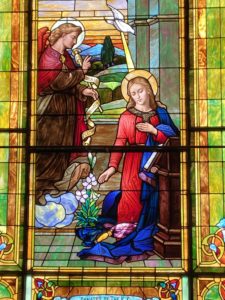
Here at the Missive we pray today especially for our own work. The word “missive” comes from the Latin word “to send,” as we see in the first words of today’s Gospel: Missus est ángelus Gábriel a Deo in civitátem Galilaéae… We celebrated the feast of St. Gabriel yesterday, as is most fitting. In his particular role as God’s messenger he brought many dispatches to humankind throughout salvation history, such as when he visited the prophet Daniel to tell him when the Savior would come, or when he brought Zechariah the news that his wife Elizabeth would bear St. John the Baptist. But the most glorious message of them all was the one he brought Our Lady on this day. It was the greatest and most blessed missive ever sent, and we pray that, through the intercession of the Mother of God and of His messenger St. Gabriel, our own humble “missives” will always bring you joy, strength and hope.
Don’t forget that if you cannot attend Mass today, there are live and recorded Masses available in abundance at LiveMass! May God bless you on this great feast day! +
O God, Who didst will that Thy Word should take flesh, at the message of an Angel, in the womb of the Blessed Virgin Mary, grant to Thy suppliant people, that we who believe her to be truly the Mother of God, may be helped by her intercession with Thee.
– the Collect for the Feast of the Annunciation
The Angelus
℣. The angel of the Lord declared unto Mary.
℟. And she conceived of the Holy Spirit.
Hail Mary…
℣. Behold the handmaid of the Lord.
℟. Be it done unto me according to thy word.
Hail Mary…
℣. And the Word was made flesh.
℟. And dwelt amongst us.
Hail Mary…
℣. Pray for us, O Holy Mother of God.
℟. That we may be made worthy of the promises of Christ.
Let us pray.
Pour forth, we beseech Thee, O Lord, Thy grace into our hearts; that we, to whom the Incarnation of Christ, Thy Son, was made known by the message of an angel, may, by His Passion and Cross, be brought to the glory of His Resurrection. Through the same Christ Our Lord.
℟. Amen.
March 25, 2020

Battling the Coronavirus in Wigratzbad

As you may have heard by now, the coronavirus struck our seminary in Wigratzbad, Germany a little over two weeks ago. The whole community faced a strict quarantine, and some were forced to spend time in the hospital. In the end, the majority of residents contracted the virus, with one priest and one seminarian still hospitalized.
However, we can share some positive developments. The seminary’s collective efforts at recovery have gone well, and, Deo gratias, they are on the upswing and the number of seriously ill patients has gone down significantly. We thank you for your prayers and beg you to continue to pray for those still in the throes of the virus.
Throughout this trial the residents have been in good spirits as they have worked continually to care for one another and assist one another with the duties of the seminary. The smiles and laughter we are used to seeing from them remain undiminished, those who are in recovery taking over from those who are more seriously sick, the residents bearing one another’s burdens in a very real sense.
And maybe they’ve been smiling even more than usual. After all, we hear that the seminarians have been caring for one another with exemplary dedication and charity, turning an unfortunate turn of events into an opportunity for grace.
“With the mighty help of faith, hope and charity, we are not discouraged,” reads a recent communiqué on the subject.

Certainly they are not wasting such an opportunity to put into practice the virtues in which they have trained themselves. We too have great opportunities to care for one another during these trying times. Prayer is the first support we can give to one another, and even if we cannot see or visit each other with the restrictions in place, we can still call, message and ensure that our friends and neighbors are not in any want. Though weakness and sickness afflict us in body, may our hearts grow stronger in selflessness and charity.
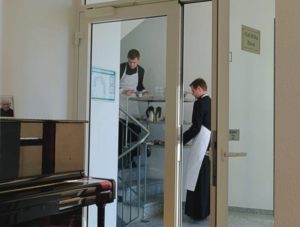
“The invisible threat of illness motivates us to have more confidence in God, and to further increase our prayers and penances,” wrote the seminary. “In union with all the sick throughout the world, and in solidarity with the general concern, we confide very calmly in divine Providence and in the maternal protection of Our Lady, help of sinners and comforter of the afflicted.”
You can follow the seminary’s blog for the latest updates. We again invite you to pray with us for an end to the coronavirus – below you will find the Prayer in Times of Epidemics, which all our priests worldwide are reciting after all Masses. +
March 23, 2020

New Plenary Indulgence Available During Pandemic!
The Apostolic Penitentiary just released new directives for a plenary indulgence that you can gain during this time of the coronavirus pandemic (N.B. this is a translation from the original Italian):
A Plenary Indulgence is granted to the faithful affected by coronavirus, or subjected to quarantine by order of the health authority in hospitals or in their own homes if, with a soul detached from any sin, they spiritually unite through the media to the celebration of the Holy Mass, the recitation of the Holy Rosary, the pious practice of the Via Crucis or other forms of devotion, or if at least they will recite the Creed, the Our Father, and a pious invocation to the Blessed Virgin Mary, offering this proof in a spirit of faith in God and charity towards our brothers and sisters, with the will to fulfill the usual conditions (sacramental confession, Eucharistic communion and prayer according to the intentions of the Holy Father), as soon as it is possible for them.
Furthermore, the Apostolic Penitentiary willingly grants a Plenary Indulgence under the same conditions on the occasion of the current world epidemic, even to those faithful who offer a visit to the Blessed Sacrament, or Eucharistic adoration, or the reading of the Holy Scriptures for at least half an hour, or the recitation of the Holy Rosary, or the pious exercise of the Via Crucis, or the recitation of the Chaplet of Divine Mercy, to implore from Almighty God the cessation of the epidemic, relief for those who are afflicted, and the eternal salvation of the many whom the Lord has called to himself.
One way you can unite yourself spiritually to the Holy Mass is through our online apostolate, LiveMass, which livestreams the Holy Mass daily from several of our locations. +
March 20, 2020

Happy Feast of St. Joseph!

A happy and most glorious feast of St. Joseph, spouse of Our Lady and foster-father of Our Lord! Today is a first-class feast of the Church, though we understand that many of you are not able to attend Mass due to the coronavirus. Remember, you can always tune in to LiveMass to pray with a livestreamed Mass from one of our locations and make a spiritual Communion in your heart. And do not be afraid or anxious. At this time of Lent, while we prepare for the Sacred Triduum in which Our Lord departs from our tabernacles and we must endure separation from Him, let us bear this little separation with peace and patience. As Our Lord said to His Apostles before His separation from them in His Passion: “Let not your hearts be troubled, neither let them be afraid” (John 14:27).
St. Joseph is the patron of the universal Church, of fathers, families, workers and a happy death. Devotion to this great saint should be an aspect of the spiritual life of every Catholic, for in so doing we are following the example of Christ Himself, Who was devoted to him on earth and placed Himself with filial love under his care. St. Teresa of Ávila tells us of his great intercessory power:
To other Saints Our Lord seems to have given power to succor us in some special necessity – but to this glorious Saint, I know by experience, He has given the power to help us in all. Our Lord would have us understand that as He was subject to St. Joseph on earth – for St. Joseph, bearing the title of father and being His guardian, could command Him – so now in Heaven Our Lord grants all his petitions.
And if we desire to increase our devotion to Our Lord and Our Lady, we have no better recourse than to St. Joseph.
We wish a happy patronal feast to all our apostolates dedicated to St. Joseph: Rockdale, IL, Richmond, VA and Tacoma, WA (and Tyler, TX, though their parish is more specifically dedicated to St. Joseph the Worker, feast day May 1st)!
Many of you undoubtedly have been praying a novena to St. Joseph in the days leading up to this great feast day. Another way you can honor him on this day is by praying the Litany of St. Joseph below. +
Lord, have mercy on us.
Christ, have mercy on us.
Lord, have mercy on us.
Christ, hear us.
Christ, graciously hear us.
God the Father of Heaven, have mercy on us.
God the Son, Redeemer of the world, have mercy on us.
God the Holy Spirit, have mercy on us.
Holy Trinity, one God, have mercy on us.
Holy Mary, pray for us.
St. Joseph, pray for us.
Illustrious son of David, etc.
Light of Patriarchs,
Spouse of the Mother of God,
Chaste guardian of the Virgin,
Foster-father of the Son of God,
Watchful defender of Christ,
Head of the Holy Family,
Joseph most just,
Joseph most chaste,
Joseph most prudent,
Joseph most strong,
Joseph most obedient,
Joseph most faithful,
Mirror of patience,
Lover of poverty,
Model of workers,
Glory of family life,
Guardian of virgins,
Pillar of families,
Solace of the afflicted,
Hope of the sick,
Patron of the dying,
Terror of demons,
Protector of Holy Church,
Lamb of God, Who takest away the sins of the world, spare us, O Lord.
Lamb of God, Who takest away the sins of the world, graciously hear us, O Lord.
Lamb of God, Who takest away the sins of the world, have mercy on us.
V. He appointed him lord of his house.
R. And prince of all his possessions.
Let us pray.
O God, Who in Thine unfathomable providence wast pleased to choose Blessed Joseph for the spouse of Thy most holy Mother, grant, we beg Thee, that we may deserve to have as our advocate in Heaven him whom we revere as our protector on earth. Who livest and reignest world without end. Amen.
March 19, 2020


